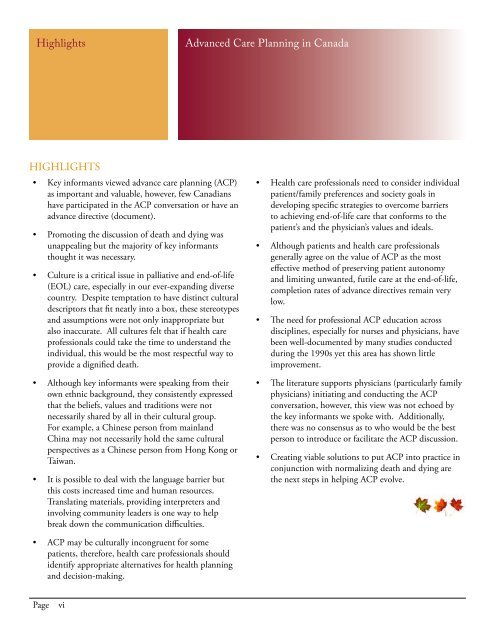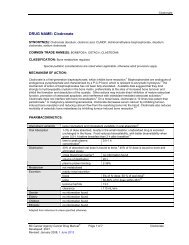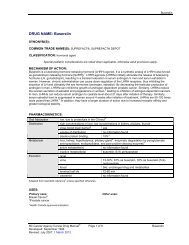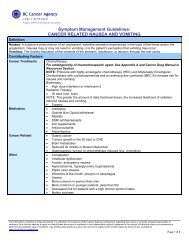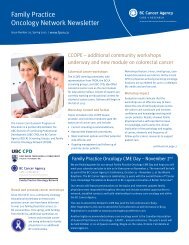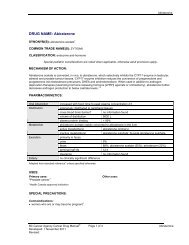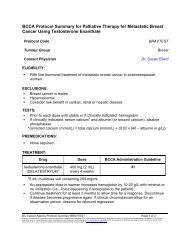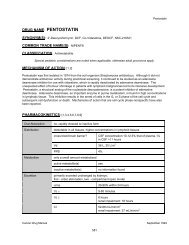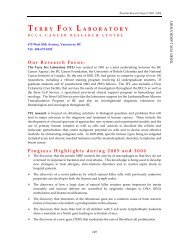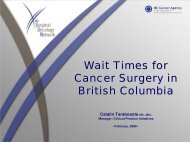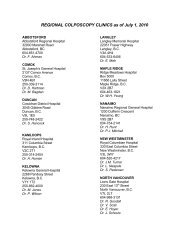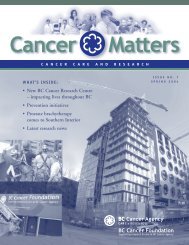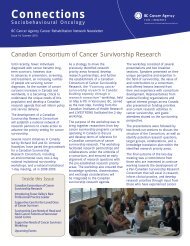Cross-Cultural Considerations in Promoting Advance Care Planning ...
Cross-Cultural Considerations in Promoting Advance Care Planning ...
Cross-Cultural Considerations in Promoting Advance Care Planning ...
Create successful ePaper yourself
Turn your PDF publications into a flip-book with our unique Google optimized e-Paper software.
Highlights<br />
<strong>Advance</strong>d <strong>Care</strong> Plann<strong>in</strong>g <strong>in</strong> Canada<br />
HIGHLIGHTS<br />
• Key <strong>in</strong>formants viewed advance care plann<strong>in</strong>g (ACP)<br />
as important and valuable, however, few Canadians<br />
have participated <strong>in</strong> the ACP conversation or have an<br />
advance directive (document).<br />
• Promot<strong>in</strong>g the discussion of death and dy<strong>in</strong>g was<br />
unappeal<strong>in</strong>g but the majority of key <strong>in</strong>formants<br />
thought it was necessary.<br />
• Culture is a critical issue <strong>in</strong> palliative and end-of-life<br />
(EOL) care, especially <strong>in</strong> our ever-expand<strong>in</strong>g diverse<br />
country. Despite temptation to have dist<strong>in</strong>ct cultural<br />
descriptors that fit neatly <strong>in</strong>to a box, these stereotypes<br />
and assumptions were not only <strong>in</strong>appropriate but<br />
also <strong>in</strong>accurate. All cultures felt that if health care<br />
professionals could take the time to understand the<br />
<strong>in</strong>dividual, this would be the most respectful way to<br />
provide a dignified death.<br />
• Although key <strong>in</strong>formants were speak<strong>in</strong>g from their<br />
own ethnic background, they consistently expressed<br />
that the beliefs, values and traditions were not<br />
necessarily shared by all <strong>in</strong> their cultural group.<br />
For example, a Ch<strong>in</strong>ese person from ma<strong>in</strong>land<br />
Ch<strong>in</strong>a may not necessarily hold the same cultural<br />
perspectives as a Ch<strong>in</strong>ese person from Hong Kong or<br />
Taiwan.<br />
• It is possible to deal with the language barrier but<br />
this costs <strong>in</strong>creased time and human resources.<br />
Translat<strong>in</strong>g materials, provid<strong>in</strong>g <strong>in</strong>terpreters and<br />
<strong>in</strong>volv<strong>in</strong>g community leaders is one way to help<br />
break down the communication difficulties.<br />
• Health care professionals need to consider <strong>in</strong>dividual<br />
patient/family preferences and society goals <strong>in</strong><br />
develop<strong>in</strong>g specific strategies to overcome barriers<br />
to achiev<strong>in</strong>g end-of-life care that conforms to the<br />
patient’s and the physician’s values and ideals.<br />
• Although patients and health care professionals<br />
generally agree on the value of ACP as the most<br />
effective method of preserv<strong>in</strong>g patient autonomy<br />
and limit<strong>in</strong>g unwanted, futile care at the end-of-life,<br />
completion rates of advance directives rema<strong>in</strong> very<br />
low.<br />
• The need for professional ACP education across<br />
discipl<strong>in</strong>es, especially for nurses and physicians, have<br />
been well-documented by many studies conducted<br />
dur<strong>in</strong>g the 1990s yet this area has shown little<br />
improvement.<br />
• The literature supports physicians (particularly family<br />
physicians) <strong>in</strong>itiat<strong>in</strong>g and conduct<strong>in</strong>g the ACP<br />
conversation, however, this view was not echoed by<br />
the key <strong>in</strong>formants we spoke with. Additionally,<br />
there was no consensus as to who would be the best<br />
person to <strong>in</strong>troduce or facilitate the ACP discussion.<br />
• Creat<strong>in</strong>g viable solutions to put ACP <strong>in</strong>to practice <strong>in</strong><br />
conjunction with normaliz<strong>in</strong>g death and dy<strong>in</strong>g are<br />
the next steps <strong>in</strong> help<strong>in</strong>g ACP evolve.<br />
• ACP may be culturally <strong>in</strong>congruent for some<br />
patients, therefore, health care professionals should<br />
identify appropriate alternatives for health plann<strong>in</strong>g<br />
and decision-mak<strong>in</strong>g.<br />
Page<br />
vi


